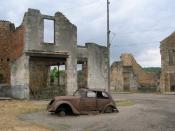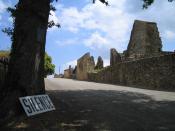Terrorism
JUNE 1914: a young man in Sarajevo steps up to a carriage and fires his pistol. The Archduke Ferdinand dies. Within weeks, the first world war has begun. The 1940s: the French resistance kill occupying troops when and how they can. June 1944: at Oradour-sur-Glane, in central France, German SS troops take revenge, massacring 642 villagers. August 1945: the United States Air Force drops the world's first nuclear weapons. Some 190,000 Japanese die, nearly all of them civilians. Within days the second world war has ended.
Which of these four events was an act of terrorism? Which achieved anything? Which, if any, will history judge as justified? And whose history? Terrorism is not the simple, sharp-edged, bad-guy phenomenon we all love to condemn. No clear line marks off politics from the threat of force, threat from use, use from covert or open war. Who is or is not a terrorist? The suicide bomber, the rebel guerrilla, the liberation front, the armed forces of the state?
Terrorism is fundamentally a political act.
Terrorists act to advance a cause they mean to create tyranny, either directly or indirectly, so that the political order that they prefer can take the place of the current one. Terrorists can be either rebels seeking to overthrow a state or states seeking to overthrow the international order or states seeking to maintain privilege for rulers and stifle dissent among the people. In every case the motivation for terrorism is explicitly without an exception, political.
Terrorism has a long, if tainted,. pedigree. Aristotle recognized it, even if it had no name at the time, when he wrote that 'the first aim and end of tyrants is to break the spirit of their subjects.' What we know as terrorism can be traced to the Russian nihilists and anarchists...


